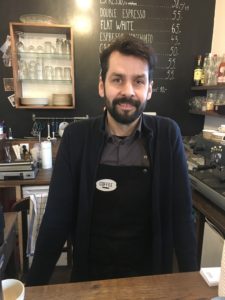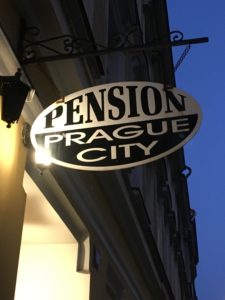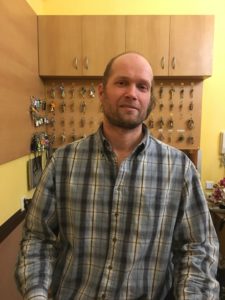When I came over the hill on the highway and saw Prague for the first time, I seriously considered driving on to Germany. It’s a mass of buildings that stretches as far as the eye can see. It’s overwhelming.
I pressed on, trying to manage my anxiety amid the six lanes of traffic.
I was going to stay at the Hostel ELF, but they didn’t offer parking. I keyed in other hotels into the GPS and ended up at the Prague City Pension, located in Prague 3. I’m going to talk a little more about that wonderfully bizarre experience in a few paragraphs.
After parking my car and storing my pack, I headed out. I figured that I had about three to four hours to explore the city, a feat that really could take a lifetime. I was intent on finding the beauty here. So, I went to something familiar–a coffeeshop.

Petr is a native of Prague and a small business owner. For him, Prague is a place of families.
Thank goodness of Petr, the owner of Coffee Imrvere.
He not only made me an excellent cup of coffee. He sat down with me and spoke to me about his home.
“Prague is the nicest city in the world. The buildings and the history and the people.”
He told me that he and his family owned the coffee shop and the shop next to it. He said it was a challenge to open and run it, but it was their dream.
“There are a lot of small businesses here,” he said.
He explained that the different sections of Prague were like their own little towns, but that they were all still Prague.
Still, Petr prefers living in Prague 3.
“Here it is better for living and meeting people. It’s a good community. For me, this is better than living in the center.”
As we chatted, a few customers came in to his shop. I could tell that they were locals and that they knew each other and Petr. I thanked him and started walking.
I was going to look for families in Prague.
I started across the street at the Olsany Cemetery, Now, as I said in my post about Inverness, I love a good cemetery. And the second I walked into it all of the sounds of the traffic and city seemed to drop away. I could hear birds. It was peaceful.
And then I noticed the couples of all ages, walking the stone pathways between the graves, holding hands and talking quietly.
I saw that there was a public park nearby and asked one couple (they were teenagers) if they could point me in the right direction.
The young man spoke a little English and helped me out.
I headed on. As I neared the park, I noticed a lot of graffiti. In fact, if you are in Prague 3, you will be inundated with the sight of graffiti. I some stone steps leading into the park, and I wasn’t sure what I would find.
Would there be a gang of taggers with paint cans and massive chips on their shoulders waiting for an unsuspecting American?
When I reached the top of the stairs into Parukarka Parks, the first thing I saw was a father walking with his little daughter. They two were holding hands and were talking to one another. I smiled and headed into the park and found more and more families. There was a playground. There were people playing with their dogs. There were people having picnic dinners.
At the highest point of Parukarka, I turned and looked down over the city. I gasped. Prague stretched in all directions–modern apartment buildings, church spires, older buildings that reminded me a Vienna, and a massive television tower that threatened to puncture the sky itself.
I decided that I would go higher and saw that there was just another park to the north–Park Vitkov.
When I reached it, I saw more and more children and parents and dogs. And the view of Prague was even grander than it was from Parukarka. At the end of the park, there’s the National Memorial with the Tomb of the Unknown Soldier there. There is a massive equestrian stature of Jan Zizka. It’s quite an amazing sight, but nothing compares to the panoramic view of Prague from here. (A lot of those views are in the video link below.)
As I walked back into Prague 3, I thought about Glasgow. I had experienced that similar moment of being overwhelmed by the busyness of the city but found a sense of peacefulness in a public park.
I went to a local pub, had a local brew, and started back to the Prague City Pension. (I would later learn that this one of three buildings owned by the same company.)
And, that’s where a different kind of adventure would soon begin.
 When I checked in, I asked two questions: 1. do you have parking? and 2. will I be able to do some laundry?
When I checked in, I asked two questions: 1. do you have parking? and 2. will I be able to do some laundry?
The answer to both questions was yes. I wasn’t able to pay just then because they’re computer system was down. The manager was on his knees behind the front desk in a tangle of wires. Another many was drilling screws into the main reception floor. I’m not sure why.
Jiri, who checked me, said I could pay later and he would show me where to put my car.
The parking was a tiny lot on the corner of the street enclosed by steel panels and locked with a padlock. It was pretty basic, but I figured the car I had rented would be safe there.
The room was simple, which was fine. The wifi was hit or miss. The shower head was on a swivel, and, when you turned it on, the water pressure was so intense that the head would turn and hit the wall. Usually, it would shoot out of the shower door and into the bathroom. Plus, you had to be quick. You only had about 60 seconds for hot water.
There were notes all over the room like “Do not leave your valuables and money in your room. We cannot guarantee their safety” and “To save water resources and to protect the environment, we only wash the towels and bed linen every 3rd day.” There was fake purple orchid covered in a light layer of dust.
When I got my clothes together and went downstairs, Jiri told me that it would cost me a hundred crowns. I said that was fine, and he gave me a key and told me that the washing machine was upstairs.
It was indeed. It was in a tiny closet. There was only a single unit, so I assumed that it was a washer/dryer unit. This was a mistake I would discover later. I put my clothes in, put some soap in, and tried to start the unit. It beeped but did not stop.

Jiri at the Prague City Pension tried to help me out with my laundry conundrum.
I asked Jiri for help. He came up to the washing machine closet and looked at the unit. He put his hands on his hips. He knelt beside it. He turned dials. He pushed buttons.
“There’s nothing can be done,” he kept saying.
Finally, the machine, as if of its own will, started.
“It is miracle, I think,” said Jiri.
I was happy that my clothes were being cleaned, and I asked him where the dryer was.
He looked at me and said, “What dryer? We have no dryer.”
Then he pointed at a folded up clothes rack and indicated that I could use that.
“When you need clothes?” Jiri asked.
I told him that I was leaving in the morning.
He shrugged his shoulders.
“There’s nothing can be done.”
When my clothes had finished being washed, I decided to try to walk to a laundromat to dry them. I told Jiri. He said, “If you think it’s best.” And then he wished me good luck with my blog.
That was the last time I saw the unusual Jiri who was also a native of Prague and had worked at the pension only a couple of weeks and had a perpetual look of helplessness on his face when he wasn’t watching the European rifle-shooting championship on YouTube.
I walked through Prague at night carrying my laundry in a yellow dry sack. I realized that it had gotten colder and that my dry sack could easily be mistaken for a bank bag full of crowns, but I pressed on.
I asked for directions to the laundromat that appeared to be only a couple of blocks away on Google maps from a man who seemed to be working security.
He shrugged. “There’s nothing to be done.” I wondered if he was Jiri’s kin.
Eventually, I realized that I was missing the laundromat because it was closed–even though it was only 7:30 in the evening.
As I headed back, I saw a bigger hotel. I figured I would give it a shot. I went in and asked if I could pay to dry my clothes there.
The man behind the desk asked me to wait a moment. He called someone. Then he looked at me and said, “We don’t use a dryer here.”
I thanked him and continued to head back to the pension. I laughed as I walked. I mentioned Garp’s short story in my previous post about Vienna. “The Grillparzer Pension” is a story about a family who travels through Austria and stays at pensions, evaluating them and giving them ratings. What’s great about the story is that the family is trying so hard to give the Grillparzer Pension a decent rating, but the owner and the circus freaks living there make it impossible. There’s a lovely scene with a bear who uses the WC.
There were moments when I felt concern or frustration about my situation at the Prague City Pension, but then I realized that I was experiencing something cultural. I bet that a lot of those families I had seen in Prague 3 that day don’t have dryers. I remembered the countless villages that I had passed through on the road to Prague where life is much slower.
“Do you have an ATM?”
“ATM?”
“Bankomat?”
“No. 50 kilometers that way.”
I realized how many Americans must appear to people who live with less access to the amenities that we simply take for granted each day.
When I got back to my room, I laid out my clothes and turned on my space heater. When I awoke, they were dry.
I headed north a little wiser.
Until my next post, keep looking to the heavens and seeking your own star.
